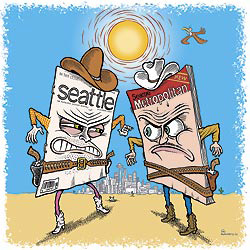Slacking is all about context. If you’re a college freshman lying on the floor of your dorm room listening to Radiohead, stoned out of your skull, you’re exploring the untold mysteries of your own mind. If you’re pushing 30, unemployed, and doing the same thing, you’re just a shiftless loser.
Distinctions like that form the crux of Tom Lutz’s new study of the American slacker. Doing Nothing is a grand tour more than an incisive thesis. It begins with the author’s 18-year-old son whose transformation from diligent student to couch potato causes Lutz to examine the Protestant work ethic’s flip side. Why do we strive not to strive— and, more importantly, can it make us happy?
Lutz finds no easy answers, though not for lack of trying. He surveys more than three centuries’ worth of self-doubting slackers and proud workaholics, starting with Ben Franklin’s exacting daily schedules. The Industrial Revolution creates dreams of a society wherein machines do all the dirty work. And, of course, Lutz can’t help but tackle the self-conscious slackers of Generation X. Unlike their Victorian, flapper, and beatnik forebears, they’re neither proud nor ashamed to shirk, just unclear what a viable alternative might be.
It’s sometimes hard to decide whether the author, an English professor at the University of Iowa, is trying to be scholarly or gently mocking his own scholarly impulses. (“We need, then, to tease the meaning of slackerism out of its many disguises and lacunae, if meaning is there to be had.”) Yet in a way, that question only reinforces the point of the book: A healthy attitude about work, Lutz decides, must contain a mixture of irreverence and seriousness. Samuel Johnson, Oscar Wilde, and other self-proclaimed literary good-for- nothings accomplished quite a lot, while those who boast of noses held to the grindstone—look no farther than Steve Carell on The Office—are often the biggest slackers of all.
It’s hardly a novel point, but the book will comfort anyone who’s ever looked at that business suit, or mop, and thought: “What am I doing here?”
Lutz might have done well, in fact, to further explore a concept he introduces late in Nothing: that sometimes all it takes is a dream of something better—like acting in movies or becoming an influential artist—for drudgery to make sense.








